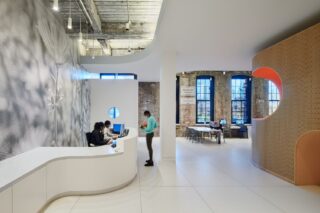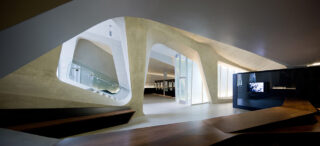The Flexible City: Solutions for a Circular and Climate Adaptive Europe

Join us for a discussion of Tom Bergevoet's and Maarten van Tuijl’s The Flexible City: Solutions for a Circular and Climate Adaptive Europe (Nai010 Publishers, 2024), in conversation with Yasemin Kologlu and Kaja Kühl. All over the world, cities struggle with an accumulation of environmental crises, including global warming, the depletion of natural resources, and pollution. This book presents a toolbox by which circularity and climate adaptation can be implemented successfully. Based on existing local qualities, the proactivity of users, and a step-by-step approach, this volume presents solutions tailored to the European situation, with its democratic tradition, the ways heritage is acknowledged and how it moves along with the unpredictability of economic tides. In The Flexible City, with the help of a network of local reporters, Bergevoet and van Tuijl compare European cities, identify similarities and trends, and describe tools and successful examples in detail. This creates an inspiring handbook for anyone contributing to the future of cities, from civil servants and policymakers to developers, designers, builders and users.
After discussing the book, a panel will address circular construction with a comparison to the wider New York context. Scaling up circular construction is challenging. Just like with any other innovation, you encounter conventions tailored to traditional construction. When using new bio-based materials and reusing existing raw materials and residual materials, it is often more difficult to demonstrate that you meet current requirements and standards. From a logistics perspective, it is challenging to coordinate material flows with the construction process. If circular construction is to make a leap in scale, it will have to be able to compete with traditional construction not only in terms of quality but also in terms of costs, while the additional pre-investments and investments will also have to be recouped financially.
Based on the book The Flexible City, we will discuss how we can take circular construction to the next level.
Speakers:
Maarten van Tuijl, Author, The Flexible City: Solutions for a Circular and Climate Adaptive Europe; Founder, Temp.architecture.urbanism; Lead Expert, EU URBACT
Yasemin Kologlu, AIA, Principal, SOM; CSU Board Member; Co-Chair, AIANY Committee on the Environment
Kaja Kühl, AICP, Founder, youarethecity; Adjunct Associate Professor, Columbia University; Adjunct Associate Professor, City College of New York Bernard and Anne Spitzer School of Architecture
About the Speakers:
Maarten van Tuijl is architect and director at temp.architecture.urbanism in Amsterdam, The Netherlands, publicist and a lead expert for the EU program URBACT. He is also a visiting guest lecturer at the Delft University of Technology and a number of academies. Van Tuijl graduated as Master of Science in Advanced Architectural Design at Columbia University in New York. After working for Rafael Vinoly, Dok architecten and UN Studio, he collaborated with the Japanese architect Naoko Hikami at na-ma architecture on various projects till 2011. Van Tuijl has been a member of the Dutch Repurposing Team and Lead Expert for the URBACT suburban network. Van Tuijl has worked closely together with Lead Partners in Antwerp, Oslo, Vienna, Dusseldorf, Barcelona, Brno, Casoria, Baia Mare, and Solin, on the sustainable and inclusive transformation of their post-war urban areas.
Van Tuijl and Tom Bergevoet founded Temp.architecture in 2011. The firm focuses on design and research. Its name is based on the concept of time: the firm works from the conviction that time is a crucial factor for reaching sufficient, sustainable design solutions. Temp.architecture works on assignments that vary in size, from renovation and interior design to planning projects on an urban scale. Recurrent themes are flexibility, transformation, circularity and climate adaptation. Among its executed projects are the entrance area of the Amsterdam UMC hospital and the social housing block Diderot. Currently, the firm is preparing the realization of their designs for the nature-inclusive residential area Weespertrekvaart and the circular housing blocks De Punt. The Flexible City book series, of which this book is the third, forms a continuous dialogue between the theoretical knowledge of the firm and its daily design practice.
Yasemin Kologlu, AIA, is a recognized leader in sustainable design and architecture. She is a Principal at Skidmore, Owings & Merrill (SOM), where she plays a central role in transforming the building industry's response to the climate crisis––most notably through work such as Urban Sequoia, a proposal for a carbon-sequestering built environment. She is the founder and leader of SOM's Global Climate Action Group, which led the firm to achieve net-zero carbon operations in 2022. She co-chairs the AIANY Committee on the Environment, is a co-founder and steering committee member of MEP2040, serves on the Carbon Leadership Forum NY Steering Committee, and regularly contributes to shaping carbon and sustainability policies with governments and professional organizations.
Kaja Kühl is an urban designer and the principal of youarethecity, a WBE certified research and design practice based in Brooklyn NY. She has extensive architecture, urban design, and planning experience from large-scale urban systems and policies to civic engagement and circular material practices. Her design work and writing have appeared in Dezeen, Oculus, Landscape Architect Magazine, Volume, AD, the Venice Architecture Biennale, Center for Architecture and Urban Omnibus.
Kühl is a passionate educator and teaches seminars and design studios at Columbia University and the City College of New York in addition to frequent workshops in non-institutional settings. Her work and teaching focuses on civic engagement and design for a regenerative, low-carbon built environment.
Kühl received a Diploma in Architecture from the Karlsruhe Institute of Technology, Germany and a M.S. in Urban Planning from Columbia University.




